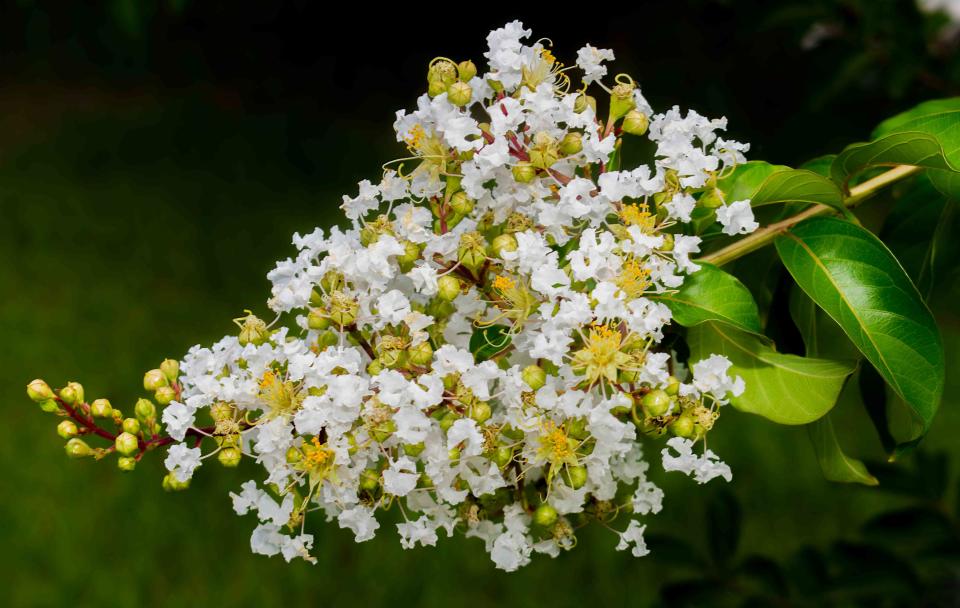12 Large And Medium Crepe Myrtle Trees For Big Impact
Crepe myrtles come in all sizes, but if you have the space for it, we say, ‘Go big!’ Here are some of our favorite types of crepe myrtles that tower above the rest.

Getty Images
Few trees have the attention-grabbing impact of a large crepe myrtle. In summer, their massive displays of color can arch walkways or provide cooling shade. Fall transforms the display into warm tones with orange, red, or yellow leaves. Winter brings stately trunks with elegant peeling bark that reveal rich shades of tan, cinnamon, or chocolate brown beneath. But for the best impact, it's important to work with a variety that best fits your space. While dwarf and semi-dwarf types exist for smaller spaces, large and medium-sized crape myrtles will flourish with sufficient space and full sun. Here are the varieties of large and medium crape myrtles to consider for your Southern garden.
Large Crepe Myrtles
Several of the common crepe myrtle varieties (Lagerstroemia indica) can reach 25’ to 40’’ so use these large varieties to create allees, to act as a buffer or privacy wall, to frame a multistoried house, or to shade your favorite sitting area. Need a shorter crepe myrtle? Buy a shorter variety of crepe myrtle. Don't ruin the beauty of these large crepe myrtle trees by wacking them back every year to control their size. Do plant these large crepe myrtles to create big impact because of their size. The only pruning that could be done is to remove spent flowers or to raise the flowering canopy by removing lower horizontal branches. Prune in late winter.
Biloxi
Upright vase shape; pale pink blooms; orange-red fall foliage.
Biloxi crepe myrtle has high mildew resistance, is drought tolerant, long bloom season, and good for growing in urban areas. Trainable as a standard but quite striking as a multitrunked tree. Winter trunks are fabulous with mottled tan and brown from peeling bark.
Height: 20’-25’
Width: 15’-25’
Hardiness Zone: 7-9A
Natchez
Broad tall tree, white frilly blooms, red-orange foliage.
Natchez has high mildew resistance, great winter bark, and weeping branches. Long blooming season.
Height: 25’-30’
Width: 15’-20’
Hardiness Zone: 6-9B
Dynamite
Upright more columner tree, fiery red flowers, orange red foliage.
Great choice when narrower crepe myrtle is needed. Beautiful winter bark.
Height: 20’-25’
Width: 10’-15’
Hardiness Zone: 6-10
Muskogee
Broad tall tree, light lavender flowers, red-orange foliage.
More rounded shape tree, attractive bark, high mildew resistance.
Height: 25’
Width: 15’
Hardiness Zone: 6-9
Tuscarora
Broad vase shape tree, coral-pink flowers, orange fall foliage.
Foliage emerges coppery-bronze in the spring, has high mildew resistance, and great light cinnamon winter bark.
Height: 20’-25’
Width: 15’-20’
Hardiness Zone: 6-9
Arapaho
Upright tree, red flowers, maroon red fall foliage.
Good mildew resistance and lovely winter trunks with peeling bark, nice choice for screening.
Height: 20’-25’
Width: 10’-15’
Hardiness Zone: 6-10
Miami
Upright tree, dark pink flowers, russet red to orange fall foliage.
High mildew resistance, chestnut brown bark,
Height: 20’-25’
Width: 15’
Hardiness Zone: 6-9
Medium-Size Crepe Myrtles
Medium-size crepe myrtles include varieties that reach heights of 12 to 20 feet. These mid-size trees can be use as large shrubs to create privacy hedges or grown in large planters. When creating crepe myrtle hedges or mass plantings be mindful of spacing. When grown too closely together they are susceptible to powdery mildew due to poor circulation. As with the larger crepe myrtles, prune only the spent flowers and any damaged branches. Medium-size crepe myrtles offer the introduction of summer long dark burgundy foliage in crepe myrtle varieties such as Delta Breeze, Thunderstruck, and Black Diamond.
Catawba
Upright, small tree; violet-purple blooms; scarlet fall foliage.
This dense multi-stemmed shrub can provide privacy even during the winter. Low maintenance, deer resistant, and fast grower.
Height: 12’- 15’
Width: 10’
Hardiness Zone: 7-9
Osage
Arching, open small tree. Vivid pink flower, beautiful mottled chestnut brown bark, red fall color.
This long blooming shrub/small tree brings cool shade with its dense rounded form. Fast grower and can live for 50 years or more.
Size: 10’- 15’
Width: 15’
Hardiness Zone: 6-9
Lipan
Broad upright and spreading tree, medium lavender flower, orange fall color.
This U.S. National Arboretum Gold Medal award-winning hybrid has high mildew resistance and a stunning mosaic of color for winter bark display.
Size: 13’-20’
Width: 6’-10’
Hardiness Zone: 6b-10
Centennial Spirit
Strong rounded tree, rose-red flowers, red-orange fall color.
Grey bark peels off to expose cream colored bark. Moderate growth.
Size: 10’-20’
Width: 15’
Hardiness Zone: 6b-9
Burgundy Cotton
Upright rounded tree, large clusters of white flowers opening from burgundy flower flower buds.
Blooms on new wood, perfect as a specimen plant or screening plant. Blooms from early summer to early fall.
Size: 10’-13’
Width: 10’-13’
Hardiness Zone: 6b-10
Frequently Asked Questions
What crepe myrtle is the fastest growing?
The 'Basham's Party Pink' crepe myrtle grows around 12 to 15 feet yearly. Crepe myrtles are fast-growing trees, with 'Red Rocket' being another variety that grows three to eight feet yearly.
Can you change the color of your crepe myrtle?
No. Changing the soil's pH with fertilizer or care will not change the color of crepe myrtle blooms as it does for hydrangeas. Discover what color blooms your crepe myrtle produces before planting to make sure you select a suitable variety.
For more Southern Living news, make sure to sign up for our newsletter!
Read the original article on Southern Living.